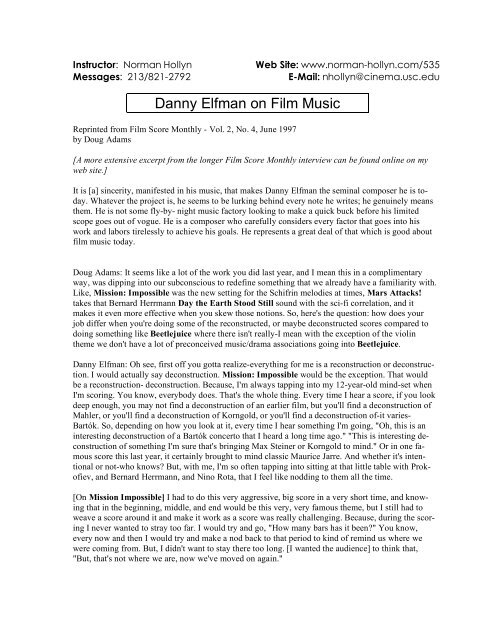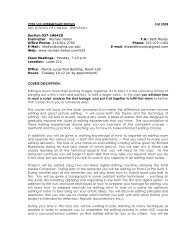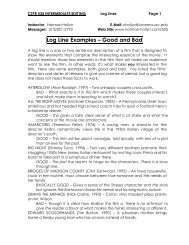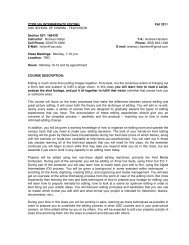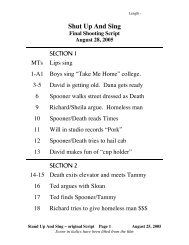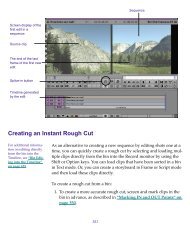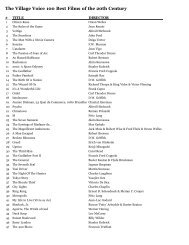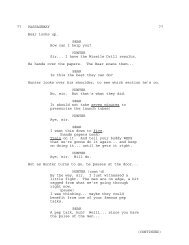Danny Elfman on Film Music - Norman Hollyn's Home of Film Editing
Danny Elfman on Film Music - Norman Hollyn's Home of Film Editing
Danny Elfman on Film Music - Norman Hollyn's Home of Film Editing
Create successful ePaper yourself
Turn your PDF publications into a flip-book with our unique Google optimized e-Paper software.
Instructor: <strong>Norman</strong> Hollyn<br />
Messages: 213/821-2792<br />
Web Site: www.norman-hollyn.com/535<br />
E-Mail: nhollyn@cinema.usc.edu<br />
<str<strong>on</strong>g>Danny</str<strong>on</strong>g> <str<strong>on</strong>g>Elfman</str<strong>on</strong>g> <strong>on</strong> <strong>Film</strong> <strong>Music</strong><br />
Reprinted from <strong>Film</strong> Score M<strong>on</strong>thly - Vol. 2, No. 4, June 1997<br />
by Doug Adams<br />
[A more extensive excerpt from the l<strong>on</strong>ger <strong>Film</strong> Score M<strong>on</strong>thly interview can be found <strong>on</strong>line <strong>on</strong> my<br />
web site.]<br />
It is [a] sincerity, manifested in his music, that makes <str<strong>on</strong>g>Danny</str<strong>on</strong>g> <str<strong>on</strong>g>Elfman</str<strong>on</strong>g> the seminal composer he is today.<br />
Whatever the project is, he seems to be lurking behind every note he writes; he genuinely means<br />
them. He is not some fly-by- night music factory looking to make a quick buck before his limited<br />
scope goes out <strong>of</strong> vogue. He is a composer who carefully c<strong>on</strong>siders every factor that goes into his<br />
work and labors tirelessly to achieve his goals. He represents a great deal <strong>of</strong> that which is good about<br />
film music today.<br />
Doug Adams: It seems like a lot <strong>of</strong> the work you did last year, and I mean this in a complimentary<br />
way, was dipping into our subc<strong>on</strong>scious to redefine something that we already have a familiarity with.<br />
Like, Missi<strong>on</strong>: Impossible was the new setting for the Schifrin melodies at times, Mars Attacks!<br />
takes that Bernard Herrmann Day the Earth Stood Still sound with the sci-fi correlati<strong>on</strong>, and it<br />
makes it even more effective when you skew those noti<strong>on</strong>s. So, here's the questi<strong>on</strong>: how does your<br />
job differ when you're doing some <strong>of</strong> the rec<strong>on</strong>structed, or maybe dec<strong>on</strong>structed scores compared to<br />
doing something like Beetlejuice where there isn't really-I mean with the excepti<strong>on</strong> <strong>of</strong> the violin<br />
theme we d<strong>on</strong>'t have a lot <strong>of</strong> prec<strong>on</strong>ceived music/drama associati<strong>on</strong>s going into Beetlejuice.<br />
<str<strong>on</strong>g>Danny</str<strong>on</strong>g> <str<strong>on</strong>g>Elfman</str<strong>on</strong>g>: Oh see, first <strong>of</strong>f you gotta realize-everything for me is a rec<strong>on</strong>structi<strong>on</strong> or dec<strong>on</strong>structi<strong>on</strong>.<br />
I would actually say dec<strong>on</strong>structi<strong>on</strong>. Missi<strong>on</strong>: Impossible would be the excepti<strong>on</strong>. That would<br />
be a rec<strong>on</strong>structi<strong>on</strong>- dec<strong>on</strong>structi<strong>on</strong>. Because, I'm always tapping into my 12-year-old mind-set when<br />
I'm scoring. You know, everybody does. That's the whole thing. Every time I hear a score, if you look<br />
deep enough, you may not find a dec<strong>on</strong>structi<strong>on</strong> <strong>of</strong> an earlier film, but you'll find a dec<strong>on</strong>structi<strong>on</strong> <strong>of</strong><br />
Mahler, or you'll find a dec<strong>on</strong>structi<strong>on</strong> <strong>of</strong> Korngold, or you'll find a dec<strong>on</strong>structi<strong>on</strong> <strong>of</strong>-it varies-<br />
Bartók. So, depending <strong>on</strong> how you look at it, every time I hear something I'm going, "Oh, this is an<br />
interesting dec<strong>on</strong>structi<strong>on</strong> <strong>of</strong> a Bartók c<strong>on</strong>certo that I heard a l<strong>on</strong>g time ago." "This is interesting dec<strong>on</strong>structi<strong>on</strong><br />
<strong>of</strong> something I'm sure that's bringing Max Steiner or Korngold to mind." Or in <strong>on</strong>e famous<br />
score this last year, it certainly brought to mind classic Maurice Jarre. And whether it's intenti<strong>on</strong>al<br />
or not-who knows? But, with me, I'm so <strong>of</strong>ten tapping into sitting at that little table with Prok<strong>of</strong>iev,<br />
and Bernard Herrmann, and Nino Rota, that I feel like nodding to them all the time.<br />
[On Missi<strong>on</strong> Impossible] I had to do this very aggressive, big score in a very short time, and knowing<br />
that in the beginning, middle, and end would be this very, very famous theme, but I still had to<br />
weave a score around it and make it work as a score was really challenging. Because, during the scoring<br />
I never wanted to stray too far. I would try and go, "How many bars has it been?" You know,<br />
every now and then I would try and make a nod back to that period to kind <strong>of</strong> remind us where we<br />
were coming from. But, I didn't want to stay there too l<strong>on</strong>g. [I wanted the audience] to think that,<br />
"But, that's not where we are, now we've moved <strong>on</strong> again."
CTPR535 <str<strong>on</strong>g>Danny</str<strong>on</strong>g> Elman <strong>on</strong> <strong>Film</strong> <strong>Music</strong> Page 2<br />
So, it was really a jigsaw puzzle where, okay I had these landmarks: beginning, middle, end. Now in<br />
between there are 62 more minutes. And in those 62 more minutes, paced every so <strong>of</strong>ten, I wanted to<br />
make sure I put a little piece <strong>of</strong> the puzzle here, here, here, here. Just to c<strong>on</strong>stantly-even if it's <strong>on</strong>ly for<br />
three sec<strong>on</strong>ds at a time, or two sec<strong>on</strong>ds, or five sec<strong>on</strong>ds, remind us from whence we came. And it was<br />
very difficult trying to keep a balance between the two eras and the two mind-sets. Not to menti<strong>on</strong> the<br />
fact that I had to come up with stuff that Brian De Palma could sing-hum-and not have the luxury <strong>of</strong> a<br />
main title with which to establish it. … The beauty <strong>of</strong> a main title is that you establish your main<br />
theme and maybe a bit <strong>of</strong> your sec<strong>on</strong>dary theme. You plant the seed that you're going to go water<br />
later in the score. And so, having that removed just made it so much more difficult. I had to just plant<br />
those in very subtle ways. That's a real important thing for me. By 15 or 30 minutes in if you can't tell<br />
where a melody's going <strong>on</strong>ce you start hearing it, then you didn't do your job right. Even if it's totally<br />
unc<strong>on</strong>scious. You hear the beginning <strong>of</strong> a melody, you should kind <strong>of</strong> know it's going to lead down<br />
this path. It should start feeling like a friend, like familiar.<br />
DA: Before 1996 it seemed like you were <strong>of</strong>ten more melodically oriented. That's not to say that<br />
you're not coming up with melodies now, but it seems like there's a lot more emphasis put <strong>on</strong> texture<br />
than you would find before.<br />
DE: A lot depends <strong>on</strong> the film, though. The more carto<strong>on</strong>y the film, the more you rely <strong>on</strong> melody in a<br />
very simple way. In other words, in a Batman (with the excepti<strong>on</strong> <strong>of</strong> where it is now!) or a Dick<br />
Tracy, what we were trying to do was more in the classical genres. You have identifiable melodies<br />
that are very simple and that can be expressed in <strong>on</strong>ly a few notes. The goal in Batman was to have a<br />
theme that if I <strong>on</strong>ly have two bars to play it, I can state it really quickly and move <strong>on</strong>, and there's no<br />
doubt in your mind that the Batman theme just played.<br />
Dick Tracy was exactly the same way. In a more melancholy way, Darkman was still essentially a<br />
sad comic [book] and had a theme that could be played very simply. Obviously, in a Sommersby, or<br />
Dolores Claiborne, you d<strong>on</strong>'t need to state what you need to state that simply. You're not pr<strong>on</strong>e to<br />
suddenly stating the character's theme for four sec<strong>on</strong>ds and then moving <strong>on</strong>. You just d<strong>on</strong>'t do that in<br />
that type <strong>of</strong> film.<br />
So I think it was more [a case] <strong>of</strong> having different kinds <strong>of</strong> films to work <strong>on</strong> this year that were less<br />
carto<strong>on</strong>-based in their approach. The [Erich] Korngold style-which is the model for so much acti<strong>on</strong><br />
and/or carto<strong>on</strong>y stuff-does that so cleanly and simply. You see the hero, you state the theme, you<br />
move <strong>on</strong>. And you have to be able to state it very quickly and clearly-certainly before Korngold there<br />
are operas that are the same thing.<br />
DA: Yeah, the whole leitmotif thing.<br />
DE: And I'm sure that's where the whole c<strong>on</strong>cept arrived from. And Korngold certainly-not <strong>on</strong>ly<br />
Korngold, <strong>of</strong> course, but he comes to mind as such a clear model for that type <strong>of</strong> score for all <strong>of</strong> us. It<br />
just makes sense. You want to have moments where you splash your bit <strong>of</strong> a theme over a gesture and<br />
then move <strong>on</strong>, and it's so fun to do that. So, Extreme Measures and Frighteners and Missi<strong>on</strong>: Impossible<br />
and Freeway-these were not these kind <strong>of</strong> films. They weren't hero-oriented. Actually, I<br />
would say Men in Black would be the closest to that type <strong>of</strong> score in the sense that we see the guys<br />
walking and there's like a motif. I'm not doing a hero theme. We're avoiding that type <strong>of</strong> gesture, so<br />
there's more like a little thing that happens whenever we see them.<br />
<str<strong>on</strong>g>Danny</str<strong>on</strong>g> the Collaborator
CTPR535 <str<strong>on</strong>g>Danny</str<strong>on</strong>g> Elman <strong>on</strong> <strong>Film</strong> <strong>Music</strong> Page 3<br />
DA: You've said it's important for you to get inside the head <strong>of</strong> the directors you work with so you<br />
can see a project through their eyes. How important is it for you to retain your identity? How much <strong>of</strong><br />
a chamele<strong>on</strong> can you be before you undermine your own individuality?<br />
DE: Well, there's a point where we all have lines that we can't cross. I'm trying to interpret the film<br />
through the director's head, but it all comes out through me. So, a composer is kind <strong>of</strong> like a psychic<br />
medium. They're holding their seance and trying to tap into the director's spirit. But, it's still coming<br />
out through their mouth when they speak. So, obviously my scores sound like my scores, but I'm trying<br />
to interpret the film through the director as much as I can. Sometimes you get real close, sometimes<br />
you d<strong>on</strong>'t. Sometimes they drive you crazy.<br />
But, I think every composer does that. That's a big part <strong>of</strong> the job. You have to write a good score that<br />
you feel good about. At least, you're supposed to. But, if the director hates it, it ain't going to be in the<br />
movie! So, it becomes an exercise in futility if you write something that does not express the film as<br />
the director wishes. It's still their ball game. It's their show. I think any successful composer learns<br />
how to dance around the director's impulses.<br />
… I think that most scores have too much music. And I think today 80, 90% <strong>of</strong> the films d<strong>on</strong>e in Hollywood<br />
are over-scored. There's a point where if a director wants music in the scene I'll go, "I might<br />
advise against it." But if they say, "No, no I really think I need it," well then, I'll just try to do the best<br />
I can and make it work. So, it's very rare that I'm trying to talk a director into having music, especially<br />
in a dialogue scene. There are always the scenes where it's very obvious. The acti<strong>on</strong> or a certain thing<br />
is happening, there's no or very little dialogue and you go, "Well, clearly the music goes here." And<br />
there are a bunch <strong>of</strong> other scenes where it's not so clear. Sometimes we'll end up, "Well, let's score it.<br />
But, if you d<strong>on</strong>'t use it, my feelings w<strong>on</strong>'t be hurt. We'll just see how it goes." Most <strong>of</strong>ten the music<br />
does end up in the movie, and sometimes there's a point where I wish that it wasn't, just because I<br />
think the score would be more effective if there was less <strong>of</strong> it. But, again, that's not my call.<br />
DA: Well, even something like-it was in Missi<strong>on</strong>: Impossible last summer. It was before the fish<br />
tank blew up. That scene in the diner.<br />
DE: Well, that was real difficult because Brian clearly wanted music there. That wasn't an experiment,<br />
"let's see what happens"-that was more like, "I want music to really play the weirdness, to make<br />
the uneasiness <strong>of</strong> Tom Cruise's character get more and more apparent, to get to the point where it<br />
feels like he's just going to topple over-feel nauseous or something." So I was trying to create a nauseous<br />
texture that was building underneath and growing and growing as it became apparent how his<br />
whole head was being turned upside-down, basically, in that scene. Everything he thought was <strong>on</strong>e<br />
way was about to turn backwards <strong>on</strong> him. And the scene was shot in this great way that I really liked.<br />
It had this uneasiness, this claustrophobia. Everything got very close and skewed and angled and I<br />
just went with Brian, really. Ultimately, I always try to go with what I'm seeing. What Brian laid out<br />
was something that felt really uneasy and bordering <strong>on</strong> feeling like I was <strong>on</strong> a boat or something. So I<br />
went with that feeling.<br />
DA: A lot <strong>of</strong> your scores go for the "feel" immediately. Maybe the arc <strong>of</strong> the story is an applicati<strong>on</strong> <strong>of</strong><br />
that. That's why I think your scores work so well in Tim Burt<strong>on</strong>'s films: the underlying themes are<br />
<strong>of</strong>ten more important than the specific story.<br />
DE: Oh, the t<strong>on</strong>e. In Tim's films the t<strong>on</strong>e is the most important thing that the score can do. In any unusual<br />
film, finding the t<strong>on</strong>e makes such a big difference. In Tim's films, more than most, if you miss<br />
the t<strong>on</strong>e, you d<strong>on</strong>'t get the film. You have to nail the right t<strong>on</strong>e because sometimes when you just see
CTPR535 <str<strong>on</strong>g>Danny</str<strong>on</strong>g> Elman <strong>on</strong> <strong>Film</strong> <strong>Music</strong> Page 4<br />
his films cold, you're not quite sure. It's the same in-I'm trying to think <strong>of</strong> other directors with a similar<br />
sense-David Lynch's films, Tim's films, some <strong>of</strong> Cr<strong>on</strong>enberg's stuff. Nailing the t<strong>on</strong>e helps you get<br />
into the film so much. Because.. I d<strong>on</strong>'t know how to explain it. If you have the wr<strong>on</strong>g t<strong>on</strong>e, suddenly<br />
the same scene seems like, "Why are they acting this way?" But, if the t<strong>on</strong>e is correct you go, "Oh<br />
okay, I'll just go with this."<br />
DA: So, a lot <strong>of</strong> times it's more obliquely than directly what the film's about?<br />
DE: Yeah. In other words, sometimes, by creating a sense <strong>of</strong> whimsy under a scene it makes you go,<br />
"Okay, they're talking about something deadly serious, but yet, it's whimsical. And I know that because<br />
the music is telling me this." To Die For was very much that way. Without the music it was<br />
kind <strong>of</strong> hard to tell. People were very c<strong>on</strong>fused whether you're allowed to laugh at the stuff that was<br />
happening. And the challenge there with the music was to create kind <strong>of</strong> a dark, whimsical t<strong>on</strong>e and<br />
make it clear right from the get-go that it's okay to have fun with this film. Yeah, it's about a murderer,<br />
but it's okay to have a bit <strong>of</strong> fun with it at her expense. So, it was real critical to nail the t<strong>on</strong>e to<br />
make that clear. There was the sense <strong>of</strong>, am I seeing a thriller? What is this?<br />
Men in Black<br />
DA: Could you talk a little bit about what you're doing new in Men in Black?<br />
DE: I d<strong>on</strong>'t know. … I just saw the film. It's a tough film in the sense that there weren't many musical<br />
sequences. It was lots <strong>of</strong> short sequences, which for a composer is very difficult. Obviously, we all<br />
hope for five or six 10-minute cues instead <strong>of</strong> 60 <strong>on</strong>e-minute cues. But, really it was finding a kind <strong>of</strong><br />
a vibe and letting that vibe carry the movie. There's kind <strong>of</strong> a cool feel that happens every now and<br />
then. I guess that feel is the thing that makes the score its own score. But, I d<strong>on</strong>'t know exactly what<br />
that is. … I just hope that that comes through somewhere in the mix. And obviously I'm going to be<br />
successful or not successful to different degrees, score by score. That's more like what I hope for. And<br />
whether I'll feel like I achieved that, I d<strong>on</strong>'t know until I get a little distance from it. I'll look back and<br />
I'd be better to answer that in about three m<strong>on</strong>ths from now. Or when the movie comes out and I see<br />
it. I d<strong>on</strong>'t even know what it is yet. I've still been in the middle <strong>of</strong> it.<br />
DA: I didn't know that it was that recent.<br />
DE: Yeah, well, it got stretched out. It was kind <strong>of</strong> odd that way. It got really stretched out and you<br />
finish writing, then you have a week <strong>of</strong> recording, then you have a week <strong>of</strong> mixing, then you mix the<br />
album stuff. You know, you're finishing the album mixes and they're already <strong>of</strong>f doing the dub. And<br />
they're dubbing right now. So, I'll go hear it for the first time in about two weeks. When I'm in the<br />
thick <strong>of</strong> it I d<strong>on</strong>'t quite know how it's going to turn out. Sometimes I'm doing stuff that is a little bit <strong>of</strong><br />
an experiment for me. And I d<strong>on</strong>'t really know how it's going to end up. And in fact, half the time in<br />
scoring that's the way. I d<strong>on</strong>'t really know what's going to happen until I see it all put together and I<br />
kind <strong>of</strong> hope for the best. I say, "God, I hope that whatever-I-was-thinking works against the movie,"<br />
and if it doesn't I'll leave town. I'll pack my bags and leave town. I've said that.<br />
(c) 1997-98 Lukas Kendall. All rights reserved.


